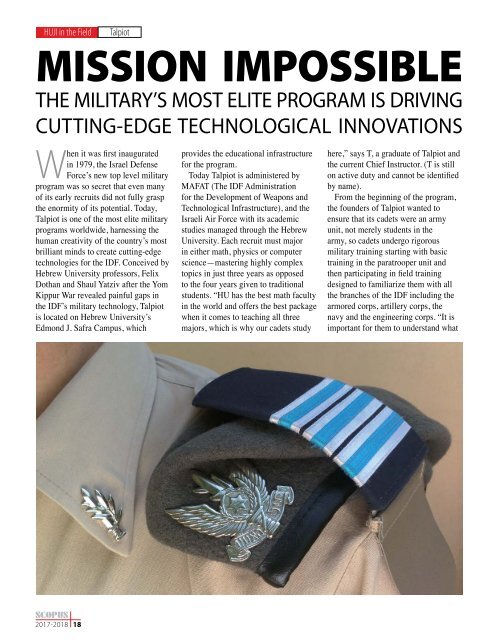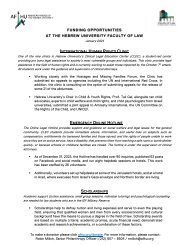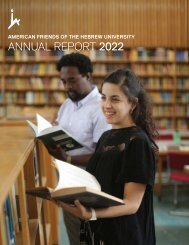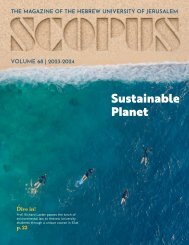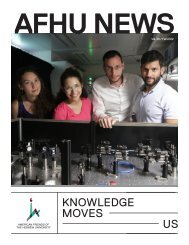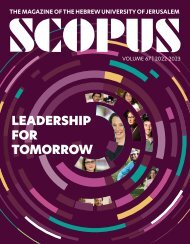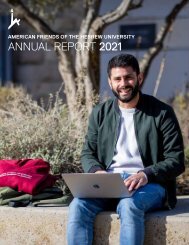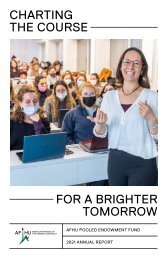Create successful ePaper yourself
Turn your PDF publications into a flip-book with our unique Google optimized e-Paper software.
Across the hall from Bar-Gill’s<br />
office, Applied Physics Prof. Uriel<br />
Levy is also stretching the limits of<br />
human imagination: he is making<br />
objects invisible. “What nature<br />
isn’t doing for you, you can now<br />
do yourself,” says Levy, who is the<br />
Director of the Harvey M. Krueger<br />
Family Center for Nanoscience<br />
and Nanotechnology and who has<br />
successfully manipulated the physical<br />
structure of silicon so that light travels<br />
around it, rather than reflecting off of it,<br />
rendering it invisible to the human eye.<br />
If these experiments can be<br />
replicated outside the lab, they can<br />
have tremendous implications for the<br />
military by making personnel and even<br />
airplanes invisible, explains Levy. But<br />
the technology could also be used in<br />
everyday life. “Suppose you are at a<br />
concert, but seated behind a pillar, so<br />
you can’t see the stage,” Levy offers.<br />
“We could wrap that pillar in this<br />
material and you would suddenly have<br />
a clear view.”<br />
A Better Way to Feed the World<br />
One of the more salient technologies<br />
that has the potential to completely<br />
upend the way we look at our food<br />
sources today is also emerging from<br />
Prof. Nahmias’ lab - the same lab that<br />
is growing human organs on chips.<br />
One of the challenges on Nahmias’s<br />
mind is that it is predicted by 2050 that<br />
the world will need to double its food<br />
supply to feed a growing and more<br />
affluent population. The safety of our<br />
food, however, is already endangered<br />
by the sheer scale and industrialization<br />
of agriculture which is needed to<br />
meet the current demand. Salmonella<br />
contaminated chicken sickens close<br />
to a million people a year in the U.S.<br />
alone.<br />
“This is the first decade in which<br />
simply eating food, even healthy<br />
food like chicken, can lead to<br />
hospitalization,” notes Nahmias. “If<br />
I want my three children to continue<br />
to eat the Nahmias Family Schnitzel,<br />
then it’s imperative to do something to<br />
change the way we produce meat.”<br />
Nahmias is using his expertise<br />
in growing tissue cells to develop<br />
an inexpensive and simple kit that<br />
will allow ordinary people to grow<br />
their own chicken meat. His startup,<br />
FutureMeat, is developing a “meat<br />
machine” that can be fed cells taken<br />
from a chicken and combined with<br />
plant-based nutrients to produce a<br />
sizeable piece of raw chicken meat<br />
within the span of a few weeks. “It’s a<br />
bit like a bread maker,” Nahmias says.<br />
Although this revolutionary idea is<br />
still under development, FutureMeat<br />
has already raised half of its funding<br />
target in an ongoing crowdfunding<br />
campaign. Should it come to fruition, it<br />
will offer the world an affordable and<br />
safe way to eat meat without having to<br />
raise or slaughter animals, a process<br />
that raises ethical concerns and is<br />
taxing our limited resources.<br />
Super Technologies<br />
and the Future<br />
Many of these incredible super<br />
technologies will ultimately succeed—<br />
but even those that don’t will impact<br />
our future in innumerable ways. The<br />
scientists working on these projects<br />
are part of a larger group of Hebrew<br />
University scientists pushing the edge<br />
of our boundaries as we know them to<br />
make our world cleaner, more humane<br />
and disease free.<br />
Through their remarkable<br />
advancements in medicine, physics,<br />
chemistry and engineering, they have<br />
shown us time and again that the<br />
science and technology exist for us to<br />
revolutionize our world. Now it is up<br />
to us to cultivate the superheroes of<br />
today to lead us into<br />
the next generation<br />
and the promise of<br />
tomorrow.<br />
“This is the first decade in which simply eating food, even healthy<br />
food like chicken, can lead to hospitalization," Prof. Yaakov Nahmias<br />
<strong>2017</strong>-2018 10


